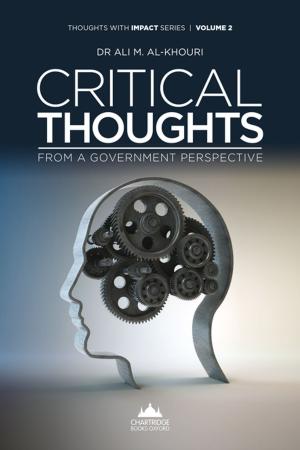Topics in Programming Languages
A Philosophical Analysis Through the Case of Prolog
Nonfiction, Computers, Programming, Programming Languages, Prolog, Religion & Spirituality, Philosophy| Author: | Luís Manuel Cabrita Pais Homem | ISBN: | 9781909287747 |
| Publisher: | Chartridge Books Oxford | Publication: | August 8, 2013 |
| Imprint: | Chartridge Books Oxford | Language: | English |
| Author: | Luís Manuel Cabrita Pais Homem |
| ISBN: | 9781909287747 |
| Publisher: | Chartridge Books Oxford |
| Publication: | August 8, 2013 |
| Imprint: | Chartridge Books Oxford |
| Language: | English |
Summary: ‘Topics in Programming Languages’ explores the arch from the formation of alphabet and classical philosophy to artificial programming languages in the structure of one argumentative topics list: as if it were philosophy interpreted and programmed. One such endeavour is taken to tend toward phonetics and sounds of speech analysis with λ-calculus, and, ultimately, Prolog - the programming language of choice in artificial intelligence - born of the natural language processing reverie and delusion. The well-ordered list of arguments targets the conceptual tree behind both the functional and the logical, the procedural and the declarative paradigms in programming languages by studying close the ascendum (convolution) of the Aristotelian efficient cause into the notions of function (Leibniz), rule (Kant) and algorithm as effective procedures in computation (Church-Turing). Key Features: Advances a synthesis between the rise of the modern alphabet and classical philosophy as a science, and the emergence of programming languages and ‘computationalism’, inviting philosophy of language to take part in artificial programming languages; Explores a route to understand how the innovative analytical cosmogony of the four causes theory put forward by Aristotle shaped satisfactorily and consistently the future frontiers of artificial intelligence; Seeks to take advantage of the classical Greek geometrical analysis, and particularly, anthyphairesis or continuous subtraction as defined by David Fowler (Euclidian algorithm), to assert a continuous interpretation from phonetics and sounds of speech to computation and programming languages; Discerns complementarily two full-size phases that help to extricate more efficiently the historical, social, cultural and scientific causes behind the rise of computation: the Calculus and the Computus moments; Helps to comprehend the origin of Computability Theory by convoking to the debate the seminal insights of authors such as Hilbert, Gödel, Church or Turing and the philosophy of mathematics, different stances or mathematical domains, such as Model Theory; Facilitates the bridge from λ-calculus to Prolog, disentangling predicate calculus from Prolog and unravelling its clausal form; Encompasses the declarative power of Prolog, in the form of arguments, into discussing the prime philosophical foundations of artificial intelligence, congregating the mathematical function, the computational algorithm and the philosophical rule; Approximates philosophy and programming through Prolog, one such programming language that has its place in the frontier between formal semantics and natural language processing, capable of revaluating the duo declarative-procedural views from the absolutist and relativist traditions in philosophy. The Author: Luís Manuel Cabrita Pais Homem graduated in philosophy in the Faculty of Letters of the University of Lisbon in 2005. He concluded the Master in the same He is currently completing his doctoral thesis. the Post-Graduate Program holds a Quality Grant, taking in automatic passage to Doctorate, the author is currently preparing the PhD thesis subordinated to the same theme. The author is an integrated member of the Centre for Philosophy of Science of the University of Lisbon since the summer of 2011. Readership: Scholars, students, programmers, computer scientists. Contents: Section I - Arguments; α) The phonetics and philosophical argument; β) The symbolic or rational argument; γ) The difficulty argument; δ) The content-and-form artificial intelligence argument; ε) The efficient cause argument; ζ) The model theory argument; Notes; Section II – Arguments; The endogenous to exogenous language argument; θ) The efficient cause continuance argument; ι) The reviewing incommensurability argument; κ) The functional and declarative programming languages argument; Notes; Section III – Arguments; λ) The λ-calculus argument; μ) The Prolog argument, Notes; Section IV - Topics in programming languages: a philosophical analysis through the case of prolog; Summary; State of the art; Goal; Detailed description; Bibliography
Summary: ‘Topics in Programming Languages’ explores the arch from the formation of alphabet and classical philosophy to artificial programming languages in the structure of one argumentative topics list: as if it were philosophy interpreted and programmed. One such endeavour is taken to tend toward phonetics and sounds of speech analysis with λ-calculus, and, ultimately, Prolog - the programming language of choice in artificial intelligence - born of the natural language processing reverie and delusion. The well-ordered list of arguments targets the conceptual tree behind both the functional and the logical, the procedural and the declarative paradigms in programming languages by studying close the ascendum (convolution) of the Aristotelian efficient cause into the notions of function (Leibniz), rule (Kant) and algorithm as effective procedures in computation (Church-Turing). Key Features: Advances a synthesis between the rise of the modern alphabet and classical philosophy as a science, and the emergence of programming languages and ‘computationalism’, inviting philosophy of language to take part in artificial programming languages; Explores a route to understand how the innovative analytical cosmogony of the four causes theory put forward by Aristotle shaped satisfactorily and consistently the future frontiers of artificial intelligence; Seeks to take advantage of the classical Greek geometrical analysis, and particularly, anthyphairesis or continuous subtraction as defined by David Fowler (Euclidian algorithm), to assert a continuous interpretation from phonetics and sounds of speech to computation and programming languages; Discerns complementarily two full-size phases that help to extricate more efficiently the historical, social, cultural and scientific causes behind the rise of computation: the Calculus and the Computus moments; Helps to comprehend the origin of Computability Theory by convoking to the debate the seminal insights of authors such as Hilbert, Gödel, Church or Turing and the philosophy of mathematics, different stances or mathematical domains, such as Model Theory; Facilitates the bridge from λ-calculus to Prolog, disentangling predicate calculus from Prolog and unravelling its clausal form; Encompasses the declarative power of Prolog, in the form of arguments, into discussing the prime philosophical foundations of artificial intelligence, congregating the mathematical function, the computational algorithm and the philosophical rule; Approximates philosophy and programming through Prolog, one such programming language that has its place in the frontier between formal semantics and natural language processing, capable of revaluating the duo declarative-procedural views from the absolutist and relativist traditions in philosophy. The Author: Luís Manuel Cabrita Pais Homem graduated in philosophy in the Faculty of Letters of the University of Lisbon in 2005. He concluded the Master in the same He is currently completing his doctoral thesis. the Post-Graduate Program holds a Quality Grant, taking in automatic passage to Doctorate, the author is currently preparing the PhD thesis subordinated to the same theme. The author is an integrated member of the Centre for Philosophy of Science of the University of Lisbon since the summer of 2011. Readership: Scholars, students, programmers, computer scientists. Contents: Section I - Arguments; α) The phonetics and philosophical argument; β) The symbolic or rational argument; γ) The difficulty argument; δ) The content-and-form artificial intelligence argument; ε) The efficient cause argument; ζ) The model theory argument; Notes; Section II – Arguments; The endogenous to exogenous language argument; θ) The efficient cause continuance argument; ι) The reviewing incommensurability argument; κ) The functional and declarative programming languages argument; Notes; Section III – Arguments; λ) The λ-calculus argument; μ) The Prolog argument, Notes; Section IV - Topics in programming languages: a philosophical analysis through the case of prolog; Summary; State of the art; Goal; Detailed description; Bibliography















